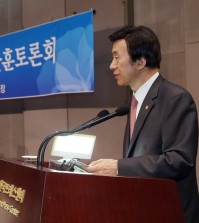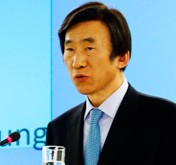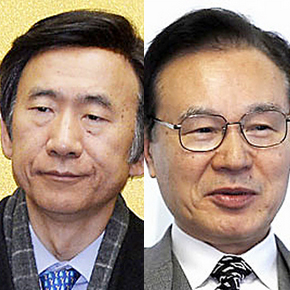- California Assembly OKs highest minimum wage in nation
- S. Korea unveils first graphic cigarette warnings
- US joins with South Korea, Japan in bid to deter North Korea
- LPGA golfer Chun In-gee finally back in action
- S. Korea won’t be top seed in final World Cup qualification round
- US men’s soccer misses 2nd straight Olympics
- US back on track in qualifying with 4-0 win over Guatemala
- High-intensity workout injuries spawn cottage industry
- CDC expands range of Zika mosquitoes into parts of Northeast
- Who knew? ‘The Walking Dead’ is helping families connect
S. Korea not in dilemma over rivalry between US, China: FM

Foreign Minister Yun Byung-se is giving an opening speech in the annual meeting of foreign missions’ chiefs held at the Ministry of Foreign Affairs’ headquarters on March 30, 2015. (Yonhap)
SEOUL, March 30 (Yonhap) — It could be a blessing rather than a dilemma for South Korea being in the middle of the U.S. and China’s growing rivalry in the Asia Pacific region, the foreign ministry said Monday.
The remarks by Foreign Minister Yun Byung-se came amid growing jitters over the country’s position as the two super powers step up efforts for a greater presence in the Asian region.
Seoul has recently decided to join the formation of the China-led Asian Infrastructure Investment Bank, defying the U.S.’ implicit reservations about the move.
Seoul is also walking a tight rope as China explicitly opposes the U.S. vision to deploy the Terminal High-Altitude Area Defense (THAAD) missile defense system in South Korea.
“Some local critics portray South Korea as suffering a side blow in a fight between big powers or sandwiched in between them,” Yun said in an opening speech for the annual meeting of South Korean foreign missions’ chiefs held in Seoul.
It is not easy to keep up South Korea’s best-ever relations with the U.S. and China at the same time, but “it could not be a headache or dilemma to receive love calls from both the U.S. and China. It could be, so to speak, a blessing,” the foreign minister noted.
“The Asia-Pacific region is big enough to accommodate both a rising China and a rebalancing U.S.,” Yun said referring to remarks by Tommy Koh, a former Singapore ambassador to the United Nations.
Yun also called for an early hosting of a trilateral summit with South Korean, Chinese and Japanese leaders, saying “strike the iron while it is hot.”
In a rare trilateral meeting of the three Northeast Asian nations’ foreign ministers earlier this month, the top diplomats agreed to resume the long-stalled trilateral summit in order to rebuild cooperation between the three nations.
The regular trilateral summit has not been held for nearly three years amid continuing history and territorial feuds stemming from Japan’s shared history with China and South Korea.
The six-day meeting brought together 175 heads from the country’s 113 foreign embassies and 43 consul generals overseas.
The mission chiefs will be briefed on the key national policies for this year, hold seminars on international and North Korean nuclear issues, and meet with citizens and businessmen before wrapping up the event on Saturday.














